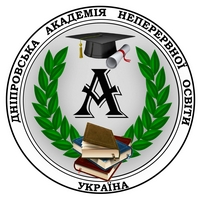Powers of editor-in-chief
Powers of editor-in-chief of a printed medium - scientific publication "Visnyk of Dnipro Academy of Continuing Education"
Series: Philosophy. Pedagogy.
This document contains recommendations on the powers of the editor-in-chief of the periodical of the Academy, his relations with other parties responsible for the functioning and development of the scientific journal of the Academy.
1. The editor-in-chief of the scientific journal of the Academy must:
have a scientific degree - Doctor of Science or Candidate of Science in the relevant specialty, academic title and the required number of scientific publications in publications indexed in WoS and / or Skopus;
have significant experience in conducting research, writing scientific articles for publication, conducting academic peer-review and scientific editing of manuscripts;
be fluent in academic English;
have international prestige among the scientific community, be a member of professional and editorial associations;
constantly improve editorial skills.
2. Rights of the editor-in-chief:
The editor-in-chief is free to choose the editorial policy and topics of the periodical, the members of the editorial board, the selection of reviewers, the evaluation of the reviewers' conclusions and the final decision on each manuscript.
Municipal Institution of Higher Education "Dnipro Academy of Continuing Education" of the Dnipropetrovsk Regional Council:
does not interfere in the internal politics and daily work of the editorial board and guarantees the editorial independence of the publication;
provides support for the magazine to fulfill its mission and tasks;
provides financial support to the magazine within the budget of the Academy and helps to obtain funding for the magazine from other sources;
enables the editor-in-chief to be in constant contact with all responsible persons who directly influence the development and work of the journal;
adheres to transparent criteria for regular and objective evaluation of the work of the editor-in-chief on the basis of pre-established and agreed indicators;
prevents outside unethical influence on the editorial board of the magazine, cares about the academic reputation of the publication, promotes compliance with objective and transparent rules in resolving conflicts.
3. Responsibilities of the editor-in-chief of the periodical to the authors:
to define guidelines for authors on the preparation and submission of manuscripts;
to ensure a clear periodical policy on authorship criteria;
to treat all authors fairly, politely, objectively, honestly and transparently;
to develop a conflict resolution policy for participants in the publication process, including editors, editorial board members, authors and reviewers;
to take measures to protect the confidentiality of the work of each author in the manner prescribed by law;
to ensure the creation of a system of effective and rapid review;
to ensure consideration of the manuscript by members of the editorial board, authors, reviewers without delay for subjective reasons;
to develop clear rules for authors on the exchange of experimental data and other additional information needed to review the manuscript;
to develop an effective procedure for consideration of issues related to the publication and decision-making by the editorial board;
to develop a procedure for dealing with issues related to the unethical behavior of authors, members of the editorial board or reviewers;
to inform the authors about the decision to further publish the manuscript;
to develop appropriate mechanisms to ensure the timely publication of accepted manuscripts;
to determine the style of citation, approve it in the editorial policy of the publication and monitor its compliance;
to ensure control over the maintenance and preservation of documents related to the functioning of the periodical (protocols of decisions of the editorial board, consent to participate and work in the editorial board, internal reviews, author's consent to publication, etc.).
4. Responsibilities of the editor-in-chief of the periodical to readers and the scientific community:
to evaluate all received manuscripts to make sure that the authors' conclusions are confirmed by the evidence presented in the manuscript;
to take care of the accuracy of references to the used literature and contact information of the authors in the articles of the journal for the needs of scientific competence;
to require authors to confirm the final version of each document before publication;
not to hide information about the sources of funding for the periodical;
to create appropriate mechanisms to identify reader needs and their satisfaction;
to maintain the internal integrity of the periodical and publish the best works of scientific and practical interest to readers;
to resolve potential conflicts of interest of persons involved in the process of reviewing manuscripts;
to promote further discussion of published research results by publishing letters to the editors, comments, messages on personal websites and other specialized communication services;
to disclose the periodical's policy on ethics, copyright, content availability, peer-review, publication fees, or any other financial requirements for authors;
to avoid any unethical manipulation of citations in periodical articles.
5. Responsibilities of the editor-in-chief of the periodical before the founder / owner / publisher:
to adhere to the stated mission, tasks, ethical principles, schedule of submission of manuscripts for prepress and schedule of periodicals;
to ensure the procedure of professional evaluation of the received manuscripts;
to report on its activities to the administration of the Academy (on pre-established and agreed indicators);
to follow the recommendations for improving the technology of dissemination of scientific knowledge used in the periodical.
Scientific Secretary
L. Pasichnyk
 ISSN
ISSN  ISSN
ISSN 

